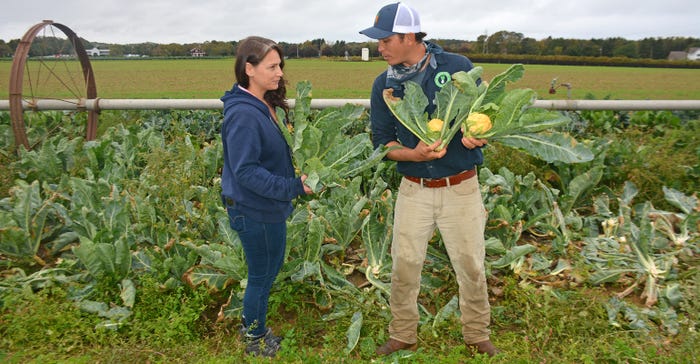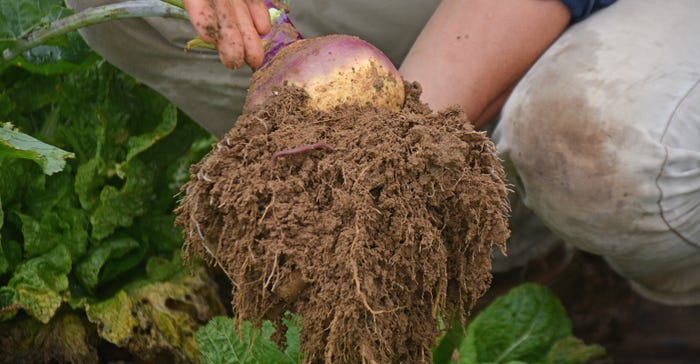On a dreary, drizzly day on Long Island’s North Fork, about two hours east of New York City, William Lee was marveling at what he was digging up with his pocketknife. Bright green patches of broccoli, cabbage and cauliflower; large rutabaga with roots as long as his forearm.
This is the time of year when Lee cashes in on his hard work.
“Ultimately, I think it's a combination of our growing practices… but through cover cropping and crop diversification, we're able to achieve some of our best environmental practices," he says.
At 35, Lee is partners with his father, Fred, running Sang Lee Farms in Peconic. The farm was started in the mid-40s by Fred Lee’s uncles — Kim Poy Lee and Hugh K. Lee — and his father, George Kim Lee, who served in World War II.
The farm supplied Chinatowns up and down the East Coast with fresh vegetables from its fields. It got so popular that in the 1950s the farm expanded to Florida during winter months for “snowbird farming.” The Lees relocated the farm to East Moriches on Long Island in 1964, before the family settled on its current location outside Peconic in 1987.
Much of the farm’s history is as a wholesale producer of vegetables and, to a lesser extent, fruit. But increased competition made it difficult for Fred Lee, the second generation, to continue the farm. So, he made the decision to focus, instead, on direct-to-retail.
William, now 35, was a young kid when his father decided to shift the business, and he remembers the decision well.
“The first thing we sold on the side of the road was actually watermelons. My father told me that if I grew them and took care of them, I could bring them up front, put them on the side of the road and sell them, and that’s what I did,” he says.
The farm stand got so popular that they opened seven days a week. They eventually opened a food kitchen making soups, pesto and other items from their vegetables, and they transitioned all the land to organic production.
100 crops, 100 acres
William likes to say that he and his father grow 100 varieties of crops on 100 acres. It’s no easy task.
The season starts with asparagus in early spring, then sugar snap peas and strawberries. Early summer brings zucchini, outdoor lettuces, spring carrots and beets, among other crops. By summer he’s looking at eggplants, peppers, tomatoes and, later, cantaloupes and watermelons.
Early fall brings cruciferous crops like broccoli and cauliflower, then root crops like beets, rutabaga, another round of carrots, and squash and pumpkins.
 PARTNERS IN CONSERVATION: Lee and Ann Marie Calabro of the Suffolk County Soil & Conservation District talk growing practices on a recent day on the farm. Calabro nominated the farm for this year’s Agricultural Environmental Award, which the farm won.
PARTNERS IN CONSERVATION: Lee and Ann Marie Calabro of the Suffolk County Soil & Conservation District talk growing practices on a recent day on the farm. Calabro nominated the farm for this year’s Agricultural Environmental Award, which the farm won.

“It’s a tough thing and it's hard to maintain buffer zones between crops and rest areas when they are chewing through ground and eating up space, so having a good three- to five-year rotation for popular crops like tomatoes or cruciferous vegetables to take care of disease without heavy spraying is something we like to do,” he says.
Hundreds of people are members of the farm’s CSA (community supported agriculture) program. The members pay for 25 weeks of vegetables throughout the season; the Lees get paid before the season for what they grow.
It’s an intense farming system, but one that Fred says positions the farm for the long term.
“A lot of the work, I have to say, was pioneered and done by Will. Yes, I guide him through a lot of things, and he’s learned a lot of things here on the farm, and we’ve been working together for many years, so it’s not something that happened overnight,” he says.
Protecting the water
What sets the farm apart, though, is its focus on environmental practices that are not only better for the farm but are better for the fragile aquifers of Long Island’s North Fork.
Cover crops help build organic matter in the soils. William says that he uses mixes of five to 10 cover crops to increase soil fertility, provide weed suppression and eliminate soil erosion.
A 500-foot permanent cover crop has been installed to protect wildlife.
Irrigation has been upgraded to more efficient micro drip systems, which William says conserves more water.
Their most well-known environmental practice, though, is resting a percentage of the farm every year and planting summer cover crops.
"It's also evident that the diversity within our product line and the diversity in the selection of the vegetables we grow ends up creating a better microbiology in the soil," he says. “Being organic doesn’t hurt either. So when we till weeds back into the ground, we increase organic matter and ultimately increase our soil moisture holding capacity, which will in turn create less of a need to irrigate.”
Their environmental practices earned them the state’s 2020 Agricultural Environmental Management Award, which for the first time this year was presented in partnership with the Leopold Conservation Award.
“It's just a really big honor to have been recognized with our growing practices and how we do things," he says.
 DEEP RESULTS: Improving soil health isn’t something that can easily be seen, until you dig out a large rutabaga with its rich soil and long roots.
DEEP RESULTS: Improving soil health isn’t something that can easily be seen, until you dig out a large rutabaga with its rich soil and long roots.

The Lees got $10,000 for winning the award. They’re not spending it on equipment or going on vacation. Instead, William’s putting the money toward another soil improvement project: a prototype sediment catchment system.
As he describes it, the project is a concrete ramp with grass runway that will help catch sediment and silt before it washes away from fields. The goal is to store the surface water and return it back to the farm as drip or overhead irrigation, and to re-apply the reclaimed nitrogen.
Coming home and staying
Although he was raised on the farm, being a farmer wasn’t always in William’s blood, or so he though early on.
He went to Fairfield University and majored in business. He then went to New York City and got jobs in investment banking and finance, though he still worked on the farm part time. Those jobs paid well, but he always had the urge to come back home.
“It wasn’t a hard thing to come back. Clearly the farm responsibilities that I had were always here,” he says.
And he always remembered what his grandfather told him: If you want to be successful in farming, you have to eat, sleep and drink the business.
William combines his father’s traditional practices with his “new age” principles of farming.
“We’re able to create a real nice perfectly size scale combination of sustainable growing practices while also producing a diversified product line,” he says. “Part of the reason we've been sustainable is that we've continued to evolve our business model. And I think we'll continue to do that, and if I had to guess within the next five to 10 years, we're going to cater to people who are interested in having their own estate garden, or having their own growing facility, or developing a greenhouse in their backyard instead of just having an open grass area.
�“I really am beginning to see people who want to grow their own food, people are going to want the education and they're going to want the knowhow, and they're going to want to know about plants in order to keep their household sustainable.”
Read more about:
PodcastsAbout the Author(s)
You May Also Like






